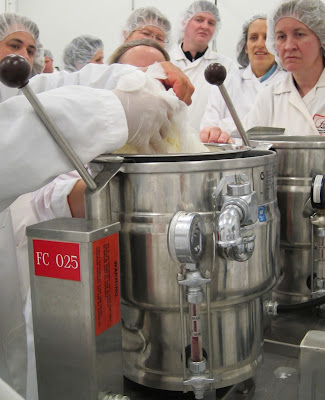Moral Certitude
I’ve just finished reading The Day George Bush Stopped Drinking: Why abstinence matters to the religious right by Jessica Warner. What fascinates me is the North American belief that we can control our lives and our destiny and the rigid thinking that leads us to believe we know what is best for other people.
The temperance movement in the United States started in the northeast and was tied into evangelical Christianity. If you followed all the rules and lived a 'pure' life, you could be saved. Purity started with abstaining from alcohol. But if alcohol was bad, then coffee and tea, which also stimulated the brain, weren’t acceptable either. Some groups outlawed meat and sugar (the origin of the Seventh Day Adventists). And sex was highly questionable and best avoided, even within marriage, except for procreation.
And it wasn’t enough to restrain from partaking in these substances or activities yourself. You also had to protect other people, and the only way to do that was by removing temptation. So it was your responsibility to prohibit alcohol so that working class men wouldn’t get drunk and beat their wives and live in poverty. (Of course, it was also helpful that this removed responsibility for poverty from decision makers and business owners.)
The British never adopted this line of thinking. Instead, they were strongly influenced by John Stuart Mill who advocated showing respect for a wide array of points of view – “only through diversity of opinion is there, in the existing state of human intellect, a chance of fair play to all sides of the truth.” He also believed it was wrong to impose your morality on another person. The temperance movement in England supported local bans or limited drinking hours but not outright prohibition. And it was far weaker and less successful than in North America.
Elements of evangelicalism survive today. Americans still seem to believe that they must save the world by going to war, and there is a strong movement advocating against sex before marriage. Some of the fervour for saving the world has now moved to the left with animal rights movements and feminist crusades against pornography.
My first difficulty with the evangelical perspective of moral certitude is why must we deny ourselves pleasure? What is wrong with enjoying life? And secondly, why are North Americans so uncomfortable with ambiguity and more than one opinion? And why are they so sure that they are right and that other people should do what they’re told?
My open mindedness does become a little fuzzy when discussing vegetarianism. I am a vegetarian for a variety of moral, health and economic reasons. I’ve never tried to dictate to other people – you’re perfectly welcome to eat steak in front of me (though I’d appreciate it if you didn’t discuss how nice and bloody it was). However, I do believe that factory farming is morally wrong and endangers human health. I do believe it’s wrong for North Americans to gorge on junk food while so many people are starving to death around the world. Perhaps I should be more of an activist. And perhaps I should toe the line more firmly in my own life – I buy recycled toilet paper, but I still use paper Kleenex. And I don’t buy 100% organic food because of the cost.
In the end, I support John Stuart Mill. It is highly unlikely that there is one single right answer. We should welcome debate as it will generate new ideas. And hopefully out of all those ideas will emerge some solutions – or partial solutions.
The temperance movement in the United States started in the northeast and was tied into evangelical Christianity. If you followed all the rules and lived a 'pure' life, you could be saved. Purity started with abstaining from alcohol. But if alcohol was bad, then coffee and tea, which also stimulated the brain, weren’t acceptable either. Some groups outlawed meat and sugar (the origin of the Seventh Day Adventists). And sex was highly questionable and best avoided, even within marriage, except for procreation.
And it wasn’t enough to restrain from partaking in these substances or activities yourself. You also had to protect other people, and the only way to do that was by removing temptation. So it was your responsibility to prohibit alcohol so that working class men wouldn’t get drunk and beat their wives and live in poverty. (Of course, it was also helpful that this removed responsibility for poverty from decision makers and business owners.)
The British never adopted this line of thinking. Instead, they were strongly influenced by John Stuart Mill who advocated showing respect for a wide array of points of view – “only through diversity of opinion is there, in the existing state of human intellect, a chance of fair play to all sides of the truth.” He also believed it was wrong to impose your morality on another person. The temperance movement in England supported local bans or limited drinking hours but not outright prohibition. And it was far weaker and less successful than in North America.
Elements of evangelicalism survive today. Americans still seem to believe that they must save the world by going to war, and there is a strong movement advocating against sex before marriage. Some of the fervour for saving the world has now moved to the left with animal rights movements and feminist crusades against pornography.
My first difficulty with the evangelical perspective of moral certitude is why must we deny ourselves pleasure? What is wrong with enjoying life? And secondly, why are North Americans so uncomfortable with ambiguity and more than one opinion? And why are they so sure that they are right and that other people should do what they’re told?
My open mindedness does become a little fuzzy when discussing vegetarianism. I am a vegetarian for a variety of moral, health and economic reasons. I’ve never tried to dictate to other people – you’re perfectly welcome to eat steak in front of me (though I’d appreciate it if you didn’t discuss how nice and bloody it was). However, I do believe that factory farming is morally wrong and endangers human health. I do believe it’s wrong for North Americans to gorge on junk food while so many people are starving to death around the world. Perhaps I should be more of an activist. And perhaps I should toe the line more firmly in my own life – I buy recycled toilet paper, but I still use paper Kleenex. And I don’t buy 100% organic food because of the cost.
In the end, I support John Stuart Mill. It is highly unlikely that there is one single right answer. We should welcome debate as it will generate new ideas. And hopefully out of all those ideas will emerge some solutions – or partial solutions.




Comments